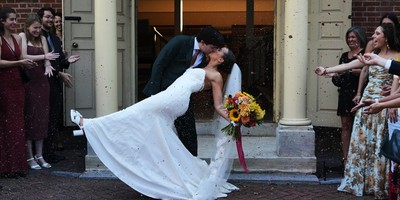Author’s Note: This is the fourth column in a series. The first three installments, “This is Providence,” “Pharisees and Pharaohs,” and “Prayers and Preparation,” can be accessed in my column archive. Some of the themes discussed in this series were also part of a speech I gave at an Alliance Defending Freedom (ADF) event in July. The full speech can be viewed by clicking on this link.
Defendant Kimberly Cook is not your ordinary sociologist. Before she even opens her mouth she comes across as an attractive and confident person. When she starts to talk it doesn’t take long to realize that she is also much brighter than the average PhD in the social sciences. Add to the equation the fact that she has a terrific sense of humor and an overflow of personal charm. In other words, she was a potentially damaging witness.
We called Defendant Cook and then the state had a chance to call her. Afterwards, we were able cross-examine her on the issues raised by the state. It was during that cross-examination that the defense case would suffer three severe setbacks.
David French began by asking Defendant Cook what she meant when she wrote a letter to me describing the “negative effects” my service was having on the department. On the stand, she said that she was referring to the fact that my “activities outside of the department left more work for other members of the department to do.” My attorneys then flashed on the screen a portion of her sworn deposition from 2009 saying that “negative effects” referred to the “universal concern regarding the personal attacks that have been waged against members of the Department in the columns written by Dr. Adams on Townhall.”
Recommended
Strike one. We had now established that a) Cook admitted under oath in deposition that the content of my columns was a factor in the decision to deny my promotion, and b) she now denied it under oath in front of the jury. When asked which of her contradictory statements should be considered true, Cook answered, “They’re both true.”
It was a classically postmodern response. It was also a turning point in the trial.
French continued by asking Defendant Cook about the Golden Seahawk service award I won back in 2005. It was a major service award given to only one member of the university community. Cook claimed under oath that she had never heard of the award until the trial. Within seconds, Travis Barham flashed another quote on the screen. It was from Cook’s 2005 annual evaluation of me in which she was talking specifically about the Golden Seahawk Award.
Strike two. We had now established that Cook knew about an award that was not included in any faculty comments about whether my service accomplishments merited promotion. Cook apparently feigned ignorance of the award to make it look like an oversight rather than active prejudice.
When my attorneys caught her in the contradiction, she replied by saying, “Thanks for reminding me.” Perhaps it was meant to be cute but it wasn’t. Thanking an attorney for catching you in a material contradiction under oath is never cute. It’s just bizarre.
Next, French turned to a book that I had written and asked Defendant Cook whether it was scholarly in nature - specifically whether it was an example of ethnography.
She had testified earlier on direct that the book was not an example of ethnography. French then demonstrated, using the 2009 deposition, that she had not seen a copy of the book at the time of the 2006 decision and had “no perception of it.”
Strike three. We had now established that Cook was offering negative assessments of my books even though, apparently, she had never read them or even seen copies of them.
In short, Defendant Cook seemed to be actively and repeatedly trying to mislead the jury. But French and Barham knew the deposition and exhibits frontwards and backwards. As a result, the principal defendant’s credibility was decimated. After a one-hour cross, I no longer thought that all hope was lost. Clearly, it was not.
Of course, there was no way to top the drama of the Cook testimony. But there were other witnesses. Defendant Cordle would testify truthfully, although not without coming across as somewhat arrogant, dismissive, and confrontational. And, even though she was firm in her criticism of my record, Defendant Levy would testify truthfully and with much greater humility. She was an effective witness.
After three full days in court, all that was left were the final arguments. The state would close in the morning with a graduate from Yale law school with an impressive resume. But I had a major advantage. In fact, I had a Major from the United States Army.
I had David French.
…To be continued.

























Join the conversation as a VIP Member